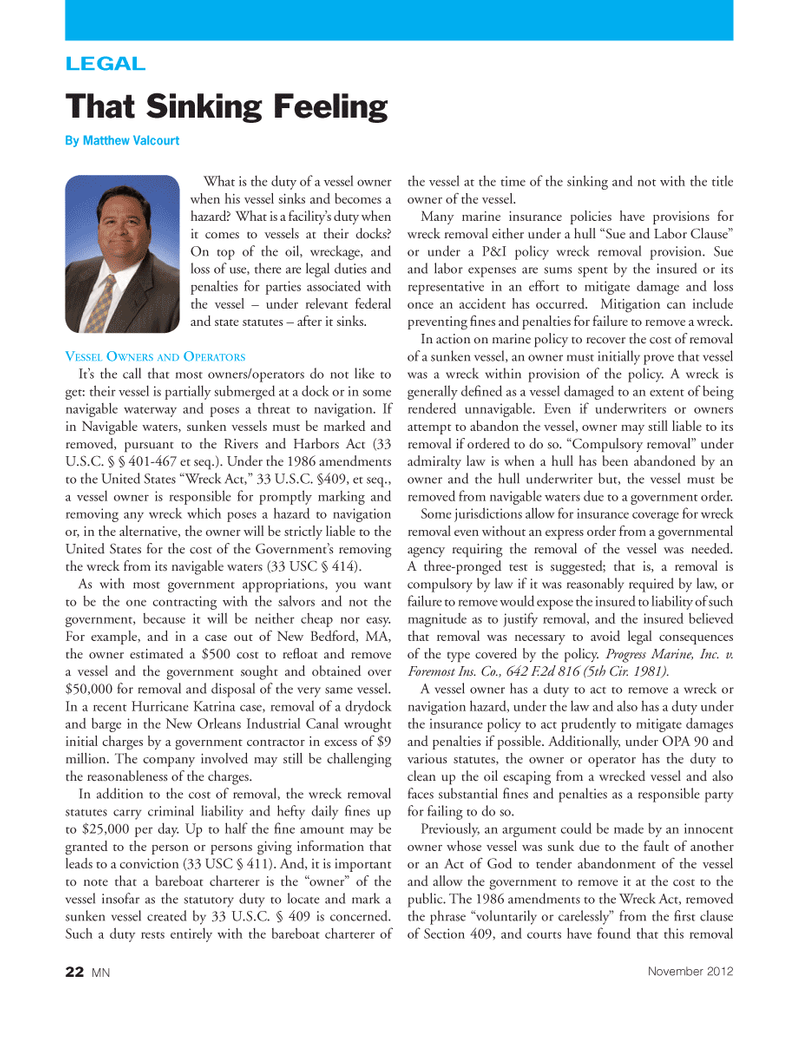
Page 22: of Marine News Magazine (November 2012)
Workboat Annual
Read this page in Pdf, Flash or Html5 edition of November 2012 Marine News Magazine
What is the duty of a vessel owner when his vessel sinks and becomes a hazard? What is a facility?s duty when it comes to vessels at their docks? On top of the oil, wreckage, and loss of use, there are legal duties and penalties for parties associated with the vessel ? under relevant federal and state statutes ? after it sinks.VESSEL OWNERS AND OPERATORS It?s the call that most owners/operators do not like to get: their vessel is partially submerged at a dock or in some navigable waterway and poses a threat to navigation. If in Navigable waters, sunken vessels must be marked and removed, pursuant to the Rivers and Harbors Act (33 U.S.C. § § 401-467 et seq.). Under the 1986 amendments to the United States ?Wreck Act,? 33 U.S.C. §409, et seq., a vessel owner is responsible for promptly marking and removing any wreck which poses a hazard to navigation or, in the alternative, the owner will be strictly liable to the United States for the cost of the Government?s removing the wreck from its navigable waters (33 USC § 414). As with most government appropriations, you want to be the one contracting with the salvors and not the government, because it will be neither cheap nor easy. For example, and in a case out of New Bedford, MA, the owner estimated a $500 cost to re oat and remove a vessel and the government sought and obtained over $50,000 for removal and disposal of the very same vessel. In a recent Hurricane Katrina case, removal of a drydock and barge in the New Orleans Industrial Canal wrought initial charges by a government contractor in excess of $9 million. The company involved may still be challenging the reasonableness of the charges. In addition to the cost of removal, the wreck removal statutes carry criminal liability and hefty daily nes up to $25,000 per day. Up to half the ne amount may be granted to the person or persons giving information that leads to a conviction (33 USC § 411). And, it is important to note that a bareboat charterer is the ?owner? of the vessel insofar as the statutory duty to locate and mark a sunken vessel created by 33 U.S.C. § 409 is concerned. Such a duty rests entirely with the bareboat charterer of the vessel at the time of the sinking and not with the title owner of the vessel. Many marine insurance policies have provisions for wreck removal either under a hull ?Sue and Labor Clause? or under a P&I policy wreck removal provision. Sue and labor expenses are sums spent by the insured or its representative in an effort to mitigate damage and loss once an accident has occurred. Mitigation can include preventing nes and penalties for failure to remove a wreck. In action on marine policy to recover the cost of removal of a sunken vessel, an owner must initially prove that vessel was a wreck within provision of the policy. A wreck is generally de ned as a vessel damaged to an extent of being rendered unnavigable. Even if underwriters or owners attempt to abandon the vessel, owner may still liable to its removal if ordered to do so. ?Compulsory removal? under admiralty law is when a hull has been abandoned by an owner and the hull underwriter but, the vessel must be removed from navigable waters due to a government order. Some jurisdictions allow for insurance coverage for wreck removal even without an express order from a governmental agency requiring the removal of the vessel was needed. A three-pronged test is suggested; that is, a removal is compulsory by law if it was reasonably required by law, or failure to remove would expose the insured to liability of such magnitude as to justify removal, and the insured believed that removal was necessary to avoid legal consequences of the type covered by the policy. Progress Marine, Inc. v. Foremost Ins. Co., 642 F.2d 816 (5th Cir. 1981). A vessel owner has a duty to act to remove a wreck or navigation hazard, under the law and also has a duty under the insurance policy to act prudently to mitigate damages and penalties if possible. Additionally, under OPA 90 and various statutes, the owner or operator has the duty to clean up the oil escaping from a wrecked vessel and also faces substantial nes and penalties as a responsible party for failing to do so. Previously, an argument could be made by an innocent owner whose vessel was sunk due to the fault of another or an Act of God to tender abandonment of the vessel and allow the government to remove it at the cost to the public. The 1986 amendments to the Wreck Act, removed the phrase ?voluntarily or carelessly? from the rst clause of Section 409, and courts have found that this removal LEGALThat Sinking Feeling By Matthew Valcourt 22 MNNovember 2012MNNov2012 Layout 18-31.indd 22MNNov2012 Layout 18-31.indd 2210/26/2012 11:49:40 AM10/26/2012 11:49:40 AM

 21
21

 23
23
